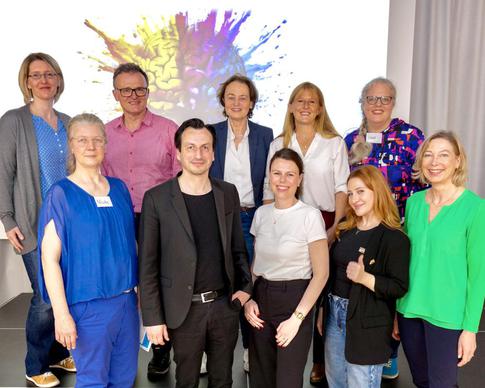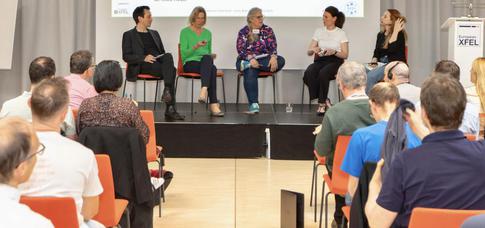XFEL: “Every Brain is Unique”: European XFEL embraces diverse cognitive abilities
“Every Brain is Unique”: European XFEL embraces diverse cognitive abilities

Participants and organisers of the Neurodiversity Panel ‘Every brain is unique’ by European XFEL and DESY in the Lighthouse Auditorium on the European XFEL Campus in Schenefeld. Photo: Kamin/European XFEL
In her welcome speech, Dr Nicole Elleuche, Managing Director of the European XFEL, emphasized the long-term goal of the panel: "We hope to create a diverse environment where all people - regardless of how they think or process information - can feel safe and thrive - to drive groundbreaking research and discoveries, which is at the heart of what both DESY and the European XFEL stand for!" In a joint video message, the members of the DESY Board of Directors, led by Prof. Dr. Beate Heinemann (Chairperson of the DESY Board of Directors), reminded the audience that it is precisely these extraordinary minds that have repeatedly given decisive impetus to science with their unique ideas and approaches.

During the panel discussion moderated by Kerstin Straub (DESY), panelists shared their very personal experiences of working in a research environment with neurodivergent conditions. Photo: Kamin/European XFEL
He also reported that there is a high co-occurrence of ASD and ADHD (up to 50%) due to an overlapping genetic basis, and noted that the neurodivergent conditions associated with ADHD and ASD can lead to comorbidities such as depression. In conclusion, Dr Schöttle reported on the strengths but also the typical difficulties that colleagues with ASD or ADHD face in the workplace, and recommended a number of measures that companies could take to significantly improve the working conditions of their neurodivergent employees. During the lecture, he answered numerous questions from the highly engaged audience in the auditorium of the European XFEL Lighthouse as well as from the audience in the DESY auditorium and online.
The lecture was followed by a dynamic panel discussion moderated by Kerstin Straub (DESY), in which the panelists shared their very personal experiences of working in a research environment with neurodivergent conditions. Among other things, the panelists described how much energy it can take to 'decipher' conversations - in addition to their daily work. They also described how they 'masked' their symptoms through a high degree of self-control and planning. When asked whether they would advise others to disclose their neurodivergent diagnosis at work, the participants agreed that it was a 'case-by-case' decision, but that trust in their managers and colleagues was a minimum requirement. All panelists described how having an 'official' diagnosis - even at an advanced age - had significantly improved their own management of symptoms.
After the panel discussion, Jan Kwietniewski from the “Beratungsstelle besondere Begabungen” (Counselling Centre for Highly Gifted Students) explained in his presentation that there is neither a "one-to-one" translation of ability into performance nor a "one-size-fits-all" solution. He also highlighted the reasons (e.g. extreme reaction to repetitive tasks) that can lead to learning blockages, emotional reactions and underachievement, especially when giftedness is sometimes associated with (other) neurodivergent conditions such as ADHD. He concluded his presentation with a brief overview of how the Hamburg school system supports highly gifted students.
Dr. Katharina Bünz and psychologist Dr. Birte Walther from the DESY occupational health team explained the support available at DESY for colleagues with neurodivergent conditions. They noted that - although they themselves do not diagnose or prescribe medication - their main task is to support the respective employees in the process of adapting their working environment to make it safer and more accessible; in addition, they can mediate in case of tensions, e.g. related to a neurodivergent condition of an employee. It was added that European XFEL colleagues could also contact Dr Bünz or book a free and confidential session via the online platform "Open up".
At the end of the event, Meike Flammer and Nicola Baark provided information about medical advice centers in the Hamburg/Schleswig-Holstein area and distributed a wide range of information material to the participants (which will soon be available online). They closed the event with the promise to initiate the establishment of a joint neurodiversity network very soon.
The day ended with a networking lunch and a guided tour of the European XFEL Facility, reinforcing the commitment of both institutions to fostering an inclusive, supportive research environment.
